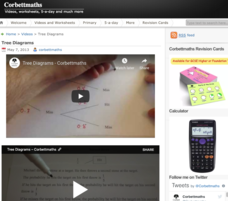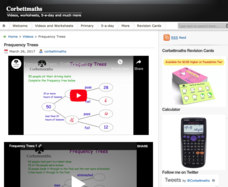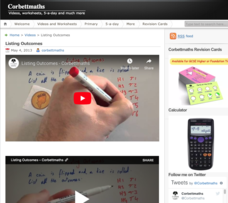Corbett Maths
Tree Diagrams
Climb out on a branch to find probabilities. Using tree diagrams, the resource shows how to find compound probabilities when the events are not uniform. The video works through two different scenarios, one where the probabilities remain...
Curated OER
How Do You Use a Tree Diagram to Count the Number of Outcomes in a Sample Space?
Deciding what to wear can be difficult, but it helps if you know your options. Use a tree diagram to solve word problems like the one in this video! Class members can watch and learn how to find and count possible outcomes (or outfits)....
statisticsfun
How To Calculate Conditional Probability Boxes With Defects
Branch out with a tree diagram. A presentation on complex probability explains the process of creating a tree diagram to represent the possible outcomes in a scenario. It then uses the diagram to calculate the...
Virtual Nerd
How Do You Use a Tree Diagram to Count the Number of Outcomes in a Sample Space?
Deciding what to wear can be difficult, but it helps if you know your options. Use a tree diagram to solve word problems like the one in this video! Class members can watch and learn how to find and count possible outcomes (or outfits)....
Corbett Maths
Frequency Trees
It's time to branch out a little! Individuals explore the usefulness of a frequency tree when organizing data in a helpful video lesson. The instruction includes constructing a frequency table from a description and then using the tree...
Flipped Math
Introduction to Probability
Chances are high that the class will probably like the lesson. Pupils view an introduction to probability and use the information to find probabilities of simple events based on the sample space. Scholars then use their knowledge of area...
Corbett Maths
Listing Outcomes
Make a list and check it twice. Many times, it is beneficial to make a list of the possible outcomes when trying to determine a probability. The resource shows how to systematically make a list and then calculate the probability of...
Veritasium
The Bayesian Trap
Explore an alternative world perspective. Scholars learn the importance of perspective in order to not fall victim to the Bayesian trap. They witness evidence that may alter their current thought processes while watching this episode of...
Crash Course
Plant Cells
Why can't plants escape prison? Because their cells were surrounded by walls. Introduce viewers to the evolution of plants with a video that discusses the differences between prokaryotic and eukaryotic cells, plant cells' organelles, and...
Virtual Nerd
Virtual Nerd: How Do You Use a Tree Diagram to Count the Number of Outcomes
Using a tree diagram is a helpful way to visualize all the possibilities from different options. Watch the step by step process of using a tree diagram. [6:16]
Khan Academy
Khan Academy: Conditional Probability Tree Diagram Example
Using a tree diagram to work out a conditional probability question. If someone fails a drug test, what is the probability that they actually are taking drugs?
Khan Academy
Khan Academy: Count Outcomes Using Tree Diagram
Demonstrates how to use a tree diagram to determine all the possible outcomes for probability scenarios. [4:31]
Virtual Nerd
Virtual Nerd: Using a Tree Diagram to Count Number of Outcomes in a Sample Space
Demonstrates how to construct a tree diagram to systematically find out how many combinations you can make from three types of shirts, two bottom types, and two kinds of shoes. [6:16]
Study Pug
Study Pug: Determining Probabilities Using Tree Diagrams and Tables
Tables and tree diagrams are useful tools to calculate probabilities. With them, you can list all the possible outcomes of an event in a clear and easy to understand way. Watch this video with an easy to understand example. [1:03]
Virtual Nerd
Virtual Nerd: Use a Tree Diagram to Count Number of Outcomes in a Sample Space
Discover how to use a tree diagram to figure out how many different outfits can be created from the possible shirts, bottoms, and shoes given. [6:16]
Sophia Learning
Sophia: The Outcome of an Event
This lesson demonstrates how to use the Fundamental Counting Principle or tree diagrams to find the probability of an event occurring. Students can watch a video tutorial and then take an online quiz.
Khan Academy
Khan Academy: Sample Spaces for Compound Events
Demonstrates how to show the sample space for a probability experiment with compound events using a tree, diagram, table, or a list. [9:09]
Sophia Learning
Sophia: The Outcome of a Series of Events
This lesson demonstrates how to find the outcome of a series of events. Students watch a video tutorial and then can take an online quiz.
Other popular searches
- Probability Tree Diagrams
- Probability, Tree Diagram
- Find Probability Tree Diagram
- Probability and Tree Diagrams
- Probability With Tree Diagrams

















